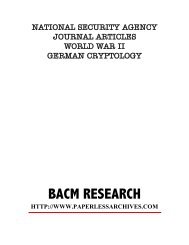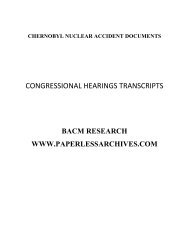Chernobyl Nuclear Power Plant CIA Files - Paperless Archives
Chernobyl Nuclear Power Plant CIA Files - Paperless Archives
Chernobyl Nuclear Power Plant CIA Files - Paperless Archives
Create successful ePaper yourself
Turn your PDF publications into a flip-book with our unique Google optimized e-Paper software.
SeCi€'----<br />
officials who had more complete information or personal<br />
contacts with foreigners to tell them what was<br />
h~p'~ning. r<br />
Gorbachev's subsequent openness and domestic reform<br />
measures have deflected public attention from<br />
Ch_ernobyl' to a considerable extent, and the heavy<br />
play given to alleged foreign overreaction to the<br />
catastrophe had some success in shifting public anger<br />
to the West. Many citizens accepted Soviet propaganda<br />
that the West was responsible for the panic and<br />
hysteria surrounding <strong>Chernobyl</strong>' and that the accident<br />
presented less public danger than the Three Mile<br />
Island accident or the Bhopal toxic gas leak that<br />
killed more than 2,000 persons -<br />
Although many Soviet citizens not directly affected<br />
by the accident ap~r to have accepted the regime's<br />
explanation, those in the affected regions continue to<br />
fault top officials for initially concealing the <strong>Chernobyl</strong>'<br />
accident. and some think the regime's response to<br />
the disaster showed the insincerity of the new openness<br />
policy. A strongly worded indictment of incompetence,<br />
which appeared in the June 1987 monthly<br />
Yunost'in the form of public letters, accused local<br />
officials at Pripyat' and Kie~'-of criminal irresponsibility<br />
for their role in the cove~up. The fire chief, Leonid<br />
Telyatnikov, who risked his life putting out the fire at<br />
the plant on the night of the explosion, was quoted by<br />
the Soviet magazine Smena as saying he was ashamed<br />
--<br />
of local Communist party officials who failed to use<br />
their power to protect the population after the<br />
disaster.<br />
Some Soviet,intellectuals were angry with the regime<br />
for failing to be honest. However, they blamed the<br />
technocrats for the accident, 'believing that the traditional<br />
arrogant attitude of nuclear bureaucracieswillingness<br />
to take risks for the sake of scientific<br />
progress at the expense of the people-has been the<br />
root cause of the <strong>Chernobyl</strong>' disaster. Some ordinary<br />
citizens share this point of view with the intellectuals.<br />
Because they believe that this attitude is pervasive<br />
among the Soviet technocrats, the public is reluctant<br />
to accept the regime's assurances that the safety of<br />
the Soviet nuclear plants has been improved in the<br />
anermath of <strong>Chernobyl</strong>'<br />
Health Problems<br />
Despite Gorbachev's success in overcoming the initial<br />
embarrassment and, even to some extent. turning the<br />
issue to his favor, there have been real long-term<br />
human costs, particularly in, the affected region. The<br />
chaotic nature of the evacuation alienated a number<br />
of the evacuees and stirred fear and resentment<br />
among the general population, thus broadening the<br />
psychological impact of the accident. The handling of<br />
the evacuation has contributed to public anxiety about<br />
health issues, which the regime has been unable to<br />
allay fully. Moscow's concern that public fears will<br />
have serious economic consequences including resistance<br />
to transfers of workers to the region, inability to<br />
sell products from the region, and increased demand<br />
for medical services by fearful people have already<br />
been borne out<br />
Although the final human toll from the effects of<br />
radiation will be difficult for scientists to predict,<br />
many of the 135,000 evacuees from the 30-kilometer<br />
zone have been exposed to sufficiently high levels of<br />
radiation to increase their risk of long-term health<br />
problems. The regime apparently acknowledged this<br />
fact when it blamed local party leaders and ministry<br />
officials at the recent trial of <strong>Chernobyl</strong>' plant managers<br />
for failing to properly protect the population from<br />
the effects of radiation fallout and for delaying the<br />
evacuation<br />
S
















